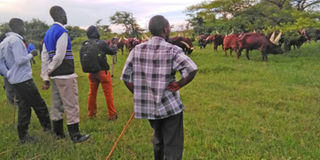How foot and mouth disease is affecting Kakumiro budget

Herdsmen at one of the farms infested with foot and mouth disease in Mpongo camp in Kakumiro District on Monday. PHOTO BY ALEX TUMUHIMBISE
KAKUMIRO- The foot and mouth disease outbreak, which has devastated several herds of cattle, was officially reported to Kakumiro District authorities in April in Mpongo camp village, Mpasana Sub-county.
Now, cattle keepers in Bugangaizi East, Kakumiro District stranded with several animals infected with the disease are crying foul over government’s failure to intervene with a vaccination programme.
The Kakumiro District veterinary officer, Dr David Waiswa, told Daily Monitor that he received the reports about the outbreak and rushed to the area only to discover that all signs pointed to foot and mouth disease.
His efforts to engage the Ministry of Agriculture officials are yet to yield anything as there is no one who has come out to supplement the district’s efforts to combat the disease.
He said the district authorities came up with some measures to prevent further spread of the disease such as banning transportation of animals and halting all cattle markets in the constituency.
Cattle market banned
“On April 29, I got a call that there is an outbreak of foot and mouth disease in Mpongo and when I reached there, I found that all signs were pointing to the disease. I wrote to the commissioner in charge of epidemiology for help and we are still waiting for them to come and take blood samples for laboratory tests,’’ Dr Waiswa said.
He added: ‘‘We have put up measures like restricting slaughtering of animals in Kisiita, Mpasana, Mpoko, Nkooko, Kisiita Town Council and Katikara and restricting the movement of animals.’’
Foot and mouth disease is a lethal viral disease of cloven hoofed livestock and wildlife.
It is caused by an RNA virus and affects only cloven-hoofed animals, including cattle, sheep, goats, swine, and various wildlife.
Following the outbreak, the Kakumiro District veterinary department has put a temporary ban on cattle markets and transportation of cattle in Mpasana, Kisiita, Katikara and Kisiita Town Council to prevent further spread of the disease which has now been reported in several cattle kraals.
Dr Waiswa said the disease outbreak is a huge blow to the district local revenue collection following the ban on cattle markets.
‘‘Revenue collection is reducing because cattle markets are the common sources. It’s a concern of the district and the whole country and we cannot just lift the ban. I urge the cattle keepers to be vigilant and they should report such cases to veterinary offices in order to contain this outbreak. As a district, we are continuing to monitor and carry out surveillance on the disease,’’ Dr Waiswa said.
“The ban is to prevent further spread of the outbreak. We are also vaccinating the animals and we are putting measures to see that it won’t affect our budget so much,” Mr Joram Ssali, the Kakumiro District deputy chief administrative officer, said.
The district council recently approved Shs18.8 billion for 2018/2019 budget. However, the district heavily depends on cattle markets as source of revenue.
The district gets on average between Shs6 million and Shs8 million per year from each market.
About five markets have so far been closed since April.
Mr Nathan Mwebesa, a cattle keeper in Mpasana, said the outbreak of the disease has thrown them into panic because cattle keeping is their only source of livelihood.
Complaint
‘‘We got the problem of this disease which has been here for one month and our animals are getting infected on a daily basis. The government has not come out to help us vaccinate our animals because we don’t have money to buy the required vaccines,’’ Mr Mwebesa said.
‘‘We are unable to sell our animals in markets and we are now stranded. We want the government to come out and help us,’’ he added.
The Mpongo Village LC1 chairman, Mr Julius Wathai, said the disease is likely to spread quickly to other areas because most of the animals are not vaccinated and even the already infected animals have not been treated.
Some cattle keepers such as Mr Isaac Behakana have welcomed the ban on cattle movements and markets. He said they have resorted to seeking help from private veterinary doctors who are charging huge sums to treat their animals.
‘‘We have been told that each cow is vaccinated at Shs7,000 by these private local veterinary doctors. We want the district or the central government to come up with a vaccination programme and save our animals,’’ Mr Behakana said.
Mr Godfrey Barugahare, the district secretary for production, said the disease has spread to several kraals in Nkooko Sub-county.
He added that the temporary ban on the cattle markets remains active until the outbreak is contained.




